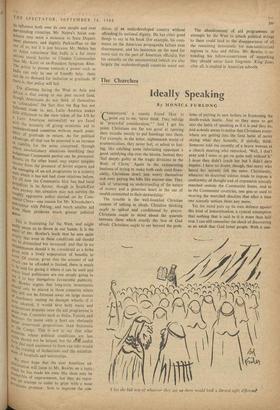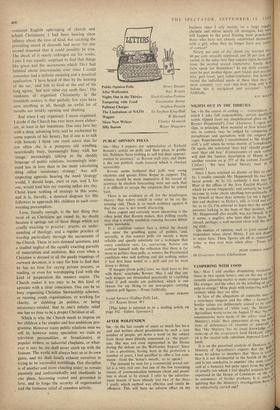The Churches
Ideally Speaking
By MONICA FURLONG
IIRISTIANS,' a caustic friend likes to
point out to me, 'never think. They indulge in "prayerful consideration."' And I get his point. Christians are far too good at opening their mouths merely to put humbugs into them. For example, in the bitter, nightmarish world of ecumenicalism, they never feel, or admit to feel- ing, like catching some infuriating opponent a good, satisfying clip over the biretta. Instead they 'feel deeply guilty at the tragic divisions in the Body of Christ.' Again in the exasperating business of trying to make both ends meet finan- cially, Christians don't just worry themselves sick over paying the bills like anyone else. They talk of 'attaining an understanding of the nature of money and a generous heart in the use of wealth committed to their stewardship.'
The trouble is the well-founded Christian custom of talking in ideals. Christian thinking ought to spiked and conditioned by prayer. Christians ought to mind about the quarrels between them which crucify the Son of God afresh. Christians ought to see beyond the prob- lems of putting in new boilers or frustrating the death-watch beetle. And so they seem to get into the habit of speaking as if it is and they do, and nobody seems to notice that Christians every- where are getting into the fatal habit of never saying what they honestly, if sinfully, think. Someone told me recently of a brave woman at a church meeting who remarked, 'Well, I don't pray and I seem to get on quite well without it.' I hope they didn't lynch her but I didn't dare inquire. I have no doubt, though, that many who heard her secretly felt the same. Christianity, whatever its doctrinal colour, tends to impose a conformity of thought and of expression scarcely matched outside the Communist States, and as in the Communist countries, one gets so used to wearing the wretched shackles that after a time one scarcely notices them any more.
Yet the mind puts up its own defence against this kind of indoctrination, a cynical assumption that nothing that is said to it is more than hall true. I can still remember the shock of discovering as an adult that God loved people. With a con- 'I bet the full text of whatever they say up there would look a darned sight differentr vcntional English upbringing of church and school Christianity I had been hearing since infancy about the love of God, but catching the prevailing mood of discredit had never for one second dreamed that it could possibly be true.
The shock of it nearly unhinged me for weeks.
Later I was equally surprised to find that things like grace and the sacraments which They had babbled about interminably ever since I could remember had a definite meaning and a practical application. 'I have heard of thee by the hearing of the ear,' said Job to God at the end of his long agony, 'but now mine eye secth thee.' The weakness of organised Christianity in ' the twentieth century is that pitifully few eyes have seen anything at all, though an awful lot of mouths are briskly opening and shutting.
And when I say organised, I mean organised. I doubt if the Church has ever been more elabor- ate, at least in her intentions. One may love her with a deep, admiring love, and be enchanted by some aspects of her beauty, but if one is to talk with honesty I think one must admit that far too often she is a pompous old windbag, neurotically busy, increasingly fussy with her 'image,' increasingly talking in the shoddy language of public relations, increasingly inter- ested less in love than in the nasty calculating thing called 'missionary strategy: Any self- respecting agnostic hearing the word 'strategy' would, I should hope, start to run, and I, for one, would lend him my running spikes any day. Christ knew nothing of strategy in this sense, and it is, literally, a damned disgrace for His followers to approach His children in such over- weening presumption.
Love, funnily enough, is the last thing that most of us Christians get round to, no doubt because it springs out of three things which arc cruelly exacting to practise: prayer, an under- standing of theolqgy, and a regular practice of worship particularly through the sacraments of the Church. These in turn demand quietness, and a studied neglect of the equally exacting pursuits of materialism and ambition. But even when a Christian is dressed in all the gaudy trappings of outward devotion, it is easy for him to find that he has no time for saying private prayers, or reading, or even for worshipping God with the kind of preparation the masters enjoin. The Church makes it too easy to be this kind of apostate with a clear conscience. One can be so busy organising Christian Stewardship schemes, or running youth organisations, or working for charity, or dabbling ,in politics, or being missionary-minded, that to one's infinite relief one has no time to be a proper Christian at all.
Which is why the Church needs to impose on her children a far simpler and less ambitious pro- gramme. However many public relations men we call in, however many specialists we train as television personalities, or broadcasters, or popular writers, or industrial chaplains, or what- ever it may be, we shall never catch up with the Joneses. The world will always beat us at its own game, and we shall fatally exhaust ourselves in trying to be successful worldlings. Our discipline is of another and more exacting order; to remain passively and undramatically and obediently in one place, becoming rooted and grounded in love, and to forgo the security of organisation and the immense relief of ceaseless activity.



































 Previous page
Previous page